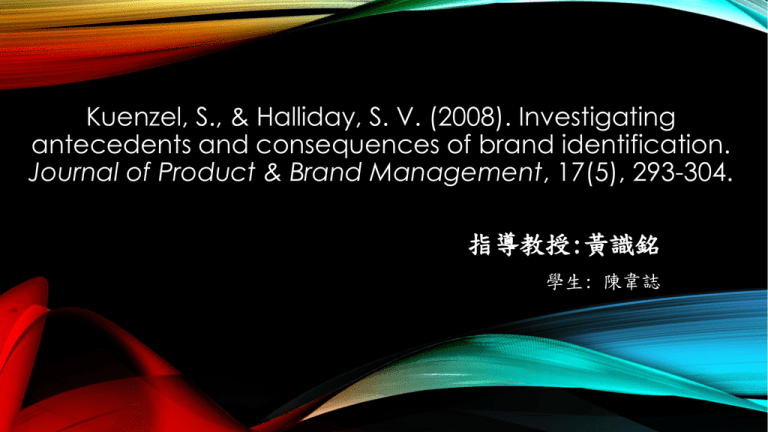Kuenzel, S., & Halliday, S. V. (2008). Investigating
advertisement

Kuenzel, S., & Halliday, S. V. (2008). Investigating antecedents and consequences of brand identification. Journal of Product & Brand Management, 17(5), 293-304. 指導教授:黃識銘 學生: 陳韋誌 ABSTRACT • Purpose – This study aims to analyse the influences of prestige, satisfaction, and communication on brand identification and to show how brand identification influences word-of-mouth and brand repurchase. ABSTRACT • Design/methodology/approach – A theoretical model is developed and tested with a sample of car owners in the UK of two global car brands. • Structural equation modelling was used with LISREL 8.54 and the maximum likelihood (ML) method. ABSTRACT • Findings –It was shown that prestige, satisfaction, and communication effect brand identification. • The study confirms that consumers’ development of relationships via brand identification results in word of mouth about the brand and intentions to repurchase the brand. • Furthermore, it was found that brand identification fully mediates the influences of prestige, satisfaction, and communication on word of mouth and brand repurchase. ABSTRACT • Research limitations/implications – The focus was on one country and one industry. • Practical implications – Managers are provided with strategies that enhance the identification of their customers with their brand so that they can strengthen the customers’ brand identification. • Originality/value – Very few previous studies have looked at brand identification which is surprising considering it is such an important variable to influence word-of-mouth and brand repurchase. ABSTRACT INTRODUCTION • 對很多公司來說,品牌是最有價值的無形資產。而過去大 多數主要的議題是圍繞在品牌關係的研究上,例如說信任 和承諾。這當中,屬於品牌管理的研究有一部分是在討論 「顧客對於他們喜愛品牌的認同」這個部分,並且運用這 樣的品牌關係去了解它在 B to B 裡所造成的經濟價值 • 所以,我們相信,品牌認同這樣的概念,可以讓我們更了 解品牌管理的內涵,而我們也就將這樣的概念放在 B to C 裡去探討它 BACKGROUND LITERATURE REVIEW • Social identity theory(探討群體關係研究中,影響深遠的理論) • 社會認同理論指出,人們通常傾向於會把自己或他人做社會歸類, 例如:組織成員、宗教信仰、性別、年齡等。不同的人,可能有不 同的歸類方式。這種社會歸類最主要的目的是讓自身和他人能夠了 解自身在社會環境當中的定位。因此,社會認同是指感知自身是屬 於某一群體的一部份。例如,一個人可能會認為自己是屬於某一群 體(例如:我是中國人,我是一個男人),而自己會視自身可以作 為這一群體的具體或象徵性的代表,認為群體的命運就像他自己的 命運一樣。 BACKGROUND LITERATURE REVIEW • 有趣的是,社會認同不一定需要組織成員間強烈的互動、相互依賴 的關係以及凝聚力也可達成。 • 樣本是14-5 歲的公立學校的學生,隨機分為兩組,結果發現個體 只要經過單純類別化成為不同的團體,就足以讓個體產生偏愛的行 為,包括對所屬團體給予較高的評價,分配較多的資源,以及較正 向的情感等內團體偏私行為 • What determines identification is just a psychological perception on the part of an individual to consider him/herself as being intertwined with a particular group.294頁左下角 BACKGROUND LITERATURE REVIEW • 心理性群組(Psychological Group),亦即擁有共有社會歸類的成員, 在不需要與其他成員互動、被其他成員喜愛或接受的情況下,也能產 生上述的內團體偏私行為 • Ashforth和Mael (1989)指出,下列因素會增加個人的組織認同程度 • 獨特性(Distinctiveness) • 名譽(Prestige) • 與群外的比較 CONCEPTUAL BACKGROUND TO HYPOTHESES • Prestige • Bergami and Bagozzi (2000)prestige is meant the perceptions that other people, whose opinions are valued, believe that the organisation or brand is well regarded, i.e. respected, admired, or well-known. • Ashforth and Mael (1989)note that “individuals often cognitively identify themselves with a winner”, which also satisfies their self-esteem. • because prestigious organisations are assumed to be successful, the prestige of an organization often serves as an indicator of organisational success • H1. Prestige is related positively to brand identification. CONCEPTUAL BACKGROUND TO HYPOTHESES • Satisfaction • In this study,satisfaction will refer to the emotional or cognitive response of the owner of a brand towards the latter after having purchased and used brand for some time period. • Bhattacharya and Sen(2003)note that Satisfaction is an antecedent of identification because satisfied customers are the ones that have fulfilled one of their self-definitional needs • H2. Satisfaction is related positively to brand identification. CONCEPTUAL BACKGROUND TO HYPOTHESES • Corporate communication(often been neglected) • in this study it refers to organisations providing information to customers. • These views are shared by Bhattacharya et al. (1995) who have claimed that the greater the contact with an organisation,the greater will be the strength of identification with that organisation. • H3. Corporate communication is related positively to brand identification. CONCEPTUAL BACKGROUND TO HYPOTHESES • Word-of-mouth • Organisational identification research suggests that when customers identify with a company they “tend to purchase more and recommend the company’s products more often” (Ahearne et al., 2005,p. 5). • H4. Identification is related positively to word-of-mouth. CONCEPTUAL BACKGROUND TO HYPOTHESES • Repurchase • In the consumer context, Bhattacharya et al. (1995) have suggested that identification may have positive consequences on brand repurchase. • H5. Identification is related positively to brand repurchase. METHODS • Research context • Cars provide sample opportunities for self-categorization • We decided to look at two car brands. These are Ford and Mercedes-Benz. Ford has been selected because it is the manufacturer in the UK with the biggest market share MercedesBenz was chosen as it is one of the best-known corporate car brands • we are interested in possible differences of the two brands and consequently we also compare them to see whether the aggregate data hides any interesting variations. METHODS • Sampling • We conducted a pilot study with 30 respondents. • A random sample of 700 car owners (350 are Ford and 350 are Mercedes-Benz owners) was selected for a mail survey. • who have bought their car from new within the last three years. • received 241 usable responses, yielding a response rate of 34.4 per cent. METHODS • • • • • Measures five-point Likert-type scale prestige we used three items based on Mael and Ashforth’s (1992) Satisfaction was measured with three items from Oliver’s (1980) Corporate communication was assessed with two items that we newly developed for this study. • Brand identification was measured with three items based on Mael and Ashforth’s(1992) • word-of-mouth developed by Arnett et al. (2003) and Ahearne et al. (2005). • We have developed a three item scale to measure repurchase. RESULTS • 先用探索性因素 分析,找到特徵 值大於1的六個因 素,總解釋力有 72% • 表一主要可看出 收斂效度,因素 負荷值都達顯著 RESULTS • 表二可以看到各題項的內部一致性(internal consistency) • Cronbach’s alpha values are above the level set by Nunnally (1978) of 0.60. • estimates of composite reliability should be above 0.60 and for average variance extracted above 0.50 (Bagozzi and Yi, 1988). RESULTS • 表三說明區別效度,浩維那篇(94頁) • 區別效度是指理論模型中某一構面與其他構面特質的差別程度。以LISREL而言, 兩個構面之間的區別效度的檢定法,是求限制模式的卡方值與未限制模式的卡方 值的差,差值愈大,表示兩個構面的區別效度愈大 RESULTS • The measurement model provided a good fit to the data:(CFI 0:96, SRMR 0:05, RMSEA 0:05 and AIC 265.20). All values of CFI, SRMR, and RMSEA meet the standards suggested by Hu and Bentler (1999): 0.95 for CFI, 0.08 for SRMR, and 0.06 for RMSEA. There are no guidelines for the AIC but lower values indicate better fit RESULTS Hu and Bentler (1999): 0.95 for CFI, 0.08 for SRMR, and 0.06 for RMSEA. There are no guidelines for the AIC but lower values indicate better fit RESULTS 299頁,討論與結論上面那一段 DISCUSSION AND CONCLUSION • Identification takes place in the context of a relationship and so our study is timely and relevant because of the numerous situations whereby customers form relationships with a brand, not entirely based on economic factors. • This current study has made an important contribution to social identity literature in empirically demonstrating that identification can indeed be a relevant concept even in cases where there is no formal membership. MANAGERIAL IMPLICATIONS • We have shown why marketers might wish to strive hard to strengthen identification by enhancing the level of prestige associated with their brand. • Such efforts are likely to increase the level of identification that brand owners feel about their brand by making brand owners “bask in reflected glory” and feel proud owners of their brand. • These sources could be quite influential in shaping the perceived prestige of an organisation. In the car industry such sources could be popular motoring shows on television or widely read car magazines MANAGERIAL IMPLICATIONS importance of corporate communication shows that customers are more likely to identify with organisations that provide relevant information and communicate well with them. • To do this most effectively managers may well have to investigate which communications medium, such as mail, phone or e-mail, customers prefer and how often they would like to receive information. • •The end •thanks


